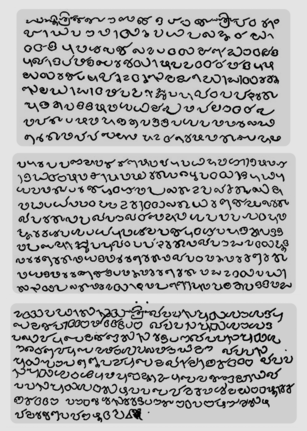Jewish copper plates of Cochin



Jewish copper plates of Cochin (Malayalam: ജൂതശാസനം), also known as Cochin plates of Bhaskara Ravi-varman, is a royal charter issued by the Chera/Perumal king of Kerala, south India to Joseph Rabban, a Jewish merchant magnate of Kodungallur.[1][2] The charter shows the status and importance of the Jewish colony in Kodungallur (Cranganore) near Cochin.[2]
It is engraved in Vattezhuthu with Grantha letters in Malayalam language (28 lines on three sides of two copper plates).[2][3] Although the traditional date according to the Cochin Jews is 379 CE, the presently accepted date of this charter is c. 1000 CE.[2][4] The plate is dated in the 38th (2 + 36) "A-series" regnal year of king Bhaskara Ravi Manukuladitya (ruled 962―1021 AD).[2] The current accepted date of the plates was determined by historian M. G. S. Narayanan.[1]
The charter records a grant by king Bhaskara Ravi Varma (Malayalam: Parkaran Iravivanman) to Joseph/Yusuf Rabban (Malayalam: Issuppu Irappan) of the rights of merchant guild anjuman (Malayalam: anjuvannam) along with several other rights and privileges.[5] Rabban is exempted from all payments made by other settlers in the city of Muyirikkode (at the same time extending to him all the rights of the other settlers). These rights and privileges are given perpetuity to all his descendants. The document is attested by a number of chieftains from southern and northern Kerala.[2] Anjuvannam, the old Malayalam form of hanjamana/anjuman[6] was a south Indian merchant guild organised by Jewish, Christian, and Islamic merchants from West Asian countries.[4][7]
The grant is or was cherished by both "Black Jews"[5] and the "White Jews" (the Spanish Jews) of Cochin as a historical document and their original settlement deed. It is carefully preserved in an iron box, known as the Pandeal, within the Paradesi Synagogue at Mattancherry.[8][5]
During the visit of Prime Minister Ariel Sharon to India in 2003, the then provincial tourism minister K. V. Thomas presented him with a replica of the copper plates.[9] Similar replicas were also gifted by Narendra Modi, the Prime Minister of India, to Prime Minister Benjamin Netanyahu during a state visit to Israel in 2017.[10]
Text
The plate is engraved in early form of Malayalam[2] using the Vattezhuthu script with Grantha letters.[2] The charter ends with a list of witnesses to the deed which includes several chieftains of southern and northern Kerala, the Commander of the Eastern Forces, and the Officer who takes down Oral Messages.[2]
Svasti Sri!
"This is the gift [prasada] that His Majesty [Tiruvadi], King of Kings [Ko Konmai Kontan Ko], Sri Parkaran Iravivanmar, who is to wield sceptre for several thousand years, was pleased to make during the thirty sixth year opposite to the second year of his reign, on the day when he was pleased to reside at Muyirikkottu.
"We have granted to Issuppu Irappan, the [guild of] ancuvannam, tolls by the boat and by other vehicles, ancuvannam dues, the right to employ the day lamp, decorative cloth, palanquin, umbrella, kettle drum, trumpet, gateway, arch, arched roof, weapons and rest of the seventy two privileges. We have remitted customs, dues and weighing fee.
"Moreover, according to this copper-plate grant, he shall be exempted from payments due to the king [koyil] from settlers in the town, but he shall enjoy what they enjoy.
"To Issuppu Irappan, proprietor of the ancuvannam, his male and female issues, nephews, and son-in-law, ancuvannam shall belong by hereditary succession as long as the sun and moon endure"
Prosperity!!
- This is attested by Kovarttana Mattandan, the utaiyavar of Venatu"
- This is attested by Kotai Cirikantan, the utaiyavar of Venpalinatu"
- This is attested by Manavepala Manaviyan, the utaiyavar of Eralanatu"
- This is attested by Irayaran Cattan, the utaiyavar of Valluvanatu"
- This is attested by Kotai Iravi, the utaiyavar of Netumpuraiyurnatu"
- This is attested by Murkkan Cattan, the Commander of the Eastern Forces"
This writing is executed by Vanralaceri Kandan-Kunrappolan, the Officer who Takes Down Oral Messages.
— Translated by M. G. S. Narayanan[11]
See also
References
- ^ a b Noburu Karashmia (ed.), A Concise History of South India: Issues and Interpretations. New Delhi: Oxford University Press, 2014. 136, 144.
- ^ a b c d e f g h i Narayanan, M. G. S. (2013), Perumāḷs of Kerala. Thrissur (Kerala): CosmoBooks, pp 451-52.
- ^ Fischel 1967, pp. 230, 236.
- ^ a b Noburu Karashmia (ed.), A Concise History of South India: Issues and Interpretations. New Delhi: Oxford University Press, 2014. 144.
- ^ a b c Narayanan, M. G. S., "Further Studies in the Jewish Copper Plates of Cochin." Indian Historical Review, Vol. 29, no. 1–2, Jan. 2002, pp. 66–76.
- ^ Narayanan, M. G. S., "Further Studies in the Jewish Copper Plates of Cochin." Indian Historical Review, Vol. 29, no. 1–2, Jan. 2002, pp. 66–76.
- ^ Y. Subbarayalu (1 June 2015). "Trade guilds of south India up to the tenth century". Studies in People's History. 2 (1): 21–26. ISSN 2348-4489
- ^ Fischel 1967, pp. 230.
- ^ "Sharon delighted with gift from Kochi". The Hindu. UNI. 10 September 2003. Retrieved 6 July 2017.
- ^ "Here's what PM Narendra Modi gifted Israeli PM Benjamin Netanyahu". The Indian Express. 5 July 2017.
- ^ Narayanan 1972, pp. 79–82.
Further reading
- Fischel, Walter J. (1967). "The Exploration of the Jewish Antiquities of Cochin on the Malabar Coast". Journal of the American Oriental Society. 87 (3): 230–248. doi:10.2307/597717. JSTOR 597717.
- Narayanan, M. G. S. (1972). Cultural Symbiosis in Kerala. Kerala Historical Society.
